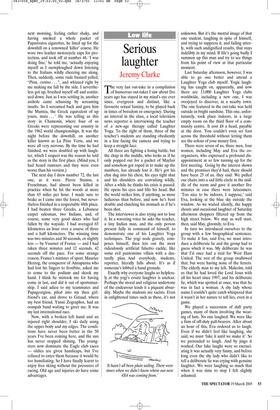Serious laughter
Jeremy Clarke
The very last out-take in a compilation of humorous out-takes I saw about five years ago has stayed in my mind’s eye ever since, evergreen and distinct, like a favourite sexual fantasy, to be played back in times of boredom or emergency. During an interval in the class, a local television news reporter is interviewing the teacher of a new-age therapy called Laughter Yoga. To the right of them, three of the teacher’s students are standing obediently in a line facing the camera and trying to keep a straight face.
All three are fighting a losing battle, but the chap in the middle, who looks as if he only popped out for a packet of Mayfair and somehow got roped in to make up the numbers, has already lost it. He’s got his chin dug into his chest, his eyes tight shut and his shoulders are convulsing wildly. After a while he thinks his crisis is passed. He opens his eyes and lifts his head. But the world strikes him, if anything, as more ludicrous than before, and now he’s bent double and clutching his stomach as if he’s been shot.
The interviewer is also trying not to lose it. In a wavering voice he asks the teacher, a tiny Indian man, and the only person present fully in command of himself, to demonstrate one of his Laughter Yoga techniques. The yogi nods gravely, composes himself, then lets out the most ridiculously artificial falsetto cackle, like some evil pantomime villain with a dastardly plan. And everybody, students, reporter, literally falls about. It’s as if someone’s lobbed a hand grenade.
Exactly why everyone laughs so helplessly at the yogi’s ersatz laughter is unclear. Perhaps the moral and religious undertone of the endeavour lends it a piquant absurdity. Maybe the students are racists. Even in enlightened times such as these, it’s not unknown. But it’s the mental image of that one student, laughing in spite of himself, and trying to suppress it, and failing utterly, with such undignified results, that stays indelibly in my mind. If life’s going badly I summon up this man and try to see things from his point of view at that particular moment.
Last Saturday afternoon, however, I was able to go one better and attend a Laughter Yoga club myself. Yogic laughing has caught on, apparently, and now there are 13,000 Laughter Yoga clubs worldwide, including a new one, I was overjoyed to discover, in a nearby town. The one featured in the out-take was held outside in bright sunshine. This one, unfortunately, took place indoors, in a large empty room on the third floor of a community centre. It cost £8 a head, payable at the door. You couldn’t even set foot across the threshold without letting them see the colour of your money first.
There were seven of us, three men, four women, including May and Eva the coorganisers, who expressed a profound disappointment at so few turning up for the first meeting. Going by the interest shown and the promises they’d had, there should have been 25 of us, they said. We pulled our chairs into a sad little circle in the middle of the room and gave it another five minutes in case there were latecomers. ‘Too nice to be indoors, I suppose,’ said Eva, looking at the blue sky outside the window. As we waited silently, the happy shouts and occasional laughter of Saturday afternoon shoppers filtered up from the high street below. We may as well start, then, said May, gloomily, to Eva.
In turn we introduced ourselves to the group with a few biographical sentences. To make it fun, said Eva, we must introduce a deliberate lie and the group had to guess which it was. My deliberate lie was that I’d once had a trial for West Ham United. The rest of the group swallowed that, but were having none of the ferrets. The elderly man to my left, Malcolm, told us that he had loved the Lord Jesus with all his heart since 1997, and his deliberate lie, which was spotted at once, was that he was in fact a woman. A shy lady whose name I couldn’t quite catch whispered that it wasn’t in her nature to tell lies, even in a game.
We played a succession of daft party games, many of them involving the wearing of hats. No one laughed. We were like a firm of off-duty pall-bearers. After about an hour of this, Eva ordered us to laugh. Even if we didn’t feel like laughing, she said, we must ‘fake it until we make it’. So we pretended to laugh. And by jingo it worked. Our fake laughs were so excruciating it was actually very funny, and before long even the shy lady who didn’t like to tell a deliberate lie was crying with genuine laughter. We were laughing so much that when it was time to stop I felt slightly ashamed.
















































 Previous page
Previous page